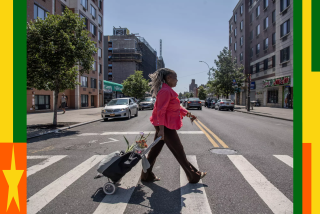Senate OKs Transit Bill Despite Bush Veto Threat
The Senate on Thursday approved a $318-billion, six-year transportation bill that pitted lawmakers eager to bring popular highway projects to their states in an election year against a president determined to restrain federal spending.
The bill, which the deficit-minded White House regards as too costly, has emerged as a potential target for President Bush’s first veto.
But a majority of Bush’s fellow Republicans joined 41 Democrats in supporting the measure, calling it the “biggest job-creation bill” that will come before Congress this year. The GOP-controlled chamber passed the bill, 76 to 21, with four Democrats joining 17 Republicans in voting against it.
“It is an essential investment in moving our economy forward while also making it safe for us to use our highways and rail systems,” Senate Majority Leader Bill Frist (R-Tenn.) said, adding that he hoped to find ways to trim the bill’s costs as it made its way through Congress.
The House has yet to act on its version of the bill, which is even more expensive at $375 billion. The White House has proposed a $256-billion measure.
The Senate bill calls for spending $255 billion on highways over the next six years and $56.5 billion for mass transit -- including building rail lines and buying buses. The measure also includes $6.5 billion for research and safety programs. The total is $100 billion more than the six-year transportation measure approved in 1998.
There are elements in the legislation designed to reduce gridlock, such as allowing states to permit solo commuters in carpool lanes if they pay a toll. It also calls for expediting the movement of freight, a provision that should benefit California because of its busy ports.
Despite its legendary traffic problems, however, California would continue to get back only 90 cents for every dollar in gas taxes it sent to Washington until 2009, when all states would receive at least 95 cents back on the dollar.
A number of less-populated states receive a larger benefit because it costs more to maintain their highways -- including those critical to the nation’s interstate system -- than their motorists pay in gas taxes.
California would receive about $21.4 billion for highway projects, about $6.1 billion more than it received under the previous highway bill and more than any other state. That was enough to persuade the state’s Democratic senators, Barbara Boxer and Dianne Feinstein, to support the measure.
The state also would receive about $5.6 billion of the public transit funds.
An acrimonious debate leading to the measure’s approval underscored the spending battles that lie ahead in Congress after Bush’s call for greater fiscal discipline -- including reducing this year’s projected $521-billion deficit by half within five years.
Several GOP senators chided members of their own party for failing to hold the line on spending.
“When does it stop?” asked Sen. John McCain (R-Ariz.). “When does the Republican Party find its soul?”
Added Sen. Rick Santorum (R-Pa.): “The signal we’re sending here is the throttle is still wide open. We’re going to spend, spend, spend.”
After the vote, the White House issued a statement criticizing the Senate for missing “an important opportunity to rein in spending” and renewing a veto threat.
“We must fund our priorities of winning the war on terror, defending the homeland and creating jobs -- and we must hold the line on spending in other areas,” the statement said.
But the bill’s supporters said the deteriorating condition of roads posed a threat to public safety. “What about the people who die because the roads are no good?” asked Sen. James Talent (R-Mo.).
Sen. Max Baucus (D-Mont.) scoffed at the veto threat. “I doubt seriously the president is going to veto this jobs bill,” he said.
While some lawmakers complained that the bill would cost too much, others objected that it didn’t give their states a big enough share.
Sens. James M. Inhofe (R-Okla.) and Christopher S. Bond (R-Mo.), both of whom helped write the bill, said some states, such as Pennsylvania, had received larger shares in the past because their representatives had crafted those bills. Under the new measure, Oklahoma and Missouri would receive a larger share, but Inhofe and Bond contended that was to make up for their states being shortchanged in the past.
The legislation has a long road ahead of it. The House has yet to act because of a dispute among Republicans over how big the bill should be.
Rep. Don Young (R-Alaska), chairman of the House Transportation and Infrastructure Committee, also has called for a gas tax increase, which Bush opposes.
Once House and Senate negotiators meet to iron out their differences, the bill’s price tag is expected to come down, but the final amount is still likely to exceed the $256 billion favored by the White House.
Administration officials have said they would recommend a veto if the highway bill called for a gas tax increase or put the government further into debt.
Though the authors of the Senate measure contend that their bill does neither, opponents said it uses accounting gimmicks -- such as cracking down on fuel tax evasion -- to mask its effect on the deficit.
Among the projects California lawmakers are seeking to include in the final bill are a study on building a tunnel to end a decades-long fight over extending the 710 Freeway north through South Pasadena; adding a carpool lane to the northbound San Diego Freeway through the Sepulveda Pass; extending a rail line from downtown Los Angeles to the city’s Eastside; and construction of grade crossings to speed freight trains carrying goods from the ports of Los Angeles and Long Beach to the east without delaying cars.
More to Read
Start your day right
Sign up for Essential California for news, features and recommendations from the L.A. Times and beyond in your inbox six days a week.
You may occasionally receive promotional content from the Los Angeles Times.







